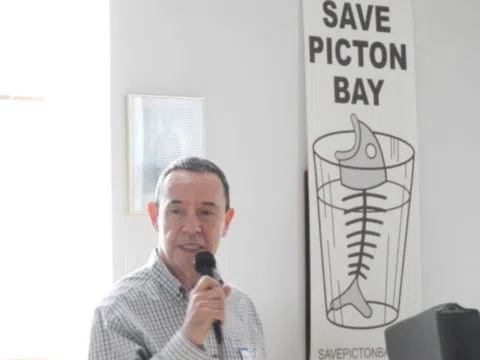
Members of Save Picton Bay at a meeting explaining an appeal of a court ruling regarding the industrial marine port Picton Terminals Saturday August 18/2018.(Photo/Quinte News)
While claiming a recent court ruling had some positives, members of Save Picton Bay and their lawyer believe more needs to be done to
control what goes on at the industrial marine port owned by the Doornekamp family and known as Picton Terminals.
At a meeting at the old Picton Town Hall Saturday afternoon, about 80 people heard why Save Picton Bay planned to appeal the recent ruling to the Ontario Court of Appeal in the near future.
In a recent ruling, a judge ruled that the northeast part of the property was being used illegally and ordered Picton Terminals to remove equipment and aggregate stockpiles from it.
Victor Lind of Save Picton Bay said that part of the ruling “was a win.”
However, the ruling allowed the rest of the property to continue to be used as it has been, but did order that a permanent storage building be constructed to stockpile salt.
Lind said that he and many others don’t want anything shipped in to the port that could end up harming fish and potentially the drinking water supply for the town of Picton. “Rock is fine, salt is fine, if stored properly, some dry goods, but nothing toxic should be allowed to get into the bay.”
Save Picton Bay maintains items such as petroleum coke, liquid fertilizer and garbage should not be allowed to be handled at Picton Terminals.
Dozens of complaints about noise, dust and bright late night lighting have been made to the Ministry of Environment. Picton Terminals is under orders to clean up its operation and the federal Department of Fisheries and Oceans has been involved and at one point found high levels of chlorides (salt) in the water.
Save Picton Bay discovered an email that an expert had sent to Picton Terminals estimating that over 10,000 tons of salt had been lost on the property over five years time.
Picton Terminals has been fined $27,000 for a petroleum coke spill.
The owners of Picton Terminals continue to work with the MOE to deal with issues at the port.
Lind also explained that changes to the Ontario Municipal Board have left much more power on land use zoning in the hands of local councils.
“Picton Terminals still has to go to council for zoning changes and a site plan agreement. We hope the new council supports our position and we’ll be active during the election campaign.”
Meanwhile the lawyer for Save Picton Bay Eric Gillespie says the judge’s ruling didn’t include evidence regarding the many complaints and findings against Picton Terminals.
Gillespie also said that local regulations in 2006 allowed the port to handle a wide variety of items, but in reality most of the time it was handling just salt.
Gillespie said there’s a significant amount of case law showing a “legal non-conforming use” involves only what was actually happening in the past, not what might have been allowed to happen and that is another reason Save Picton Bay’s appeal should be allowed.
“We have a strong case for an appeal.”
The residents organization Save Picton Bay sprang to life immediately following an oil spill from a damaged barge at Picton Terminals in March of 2017 that threatened Picton’s water supply.







